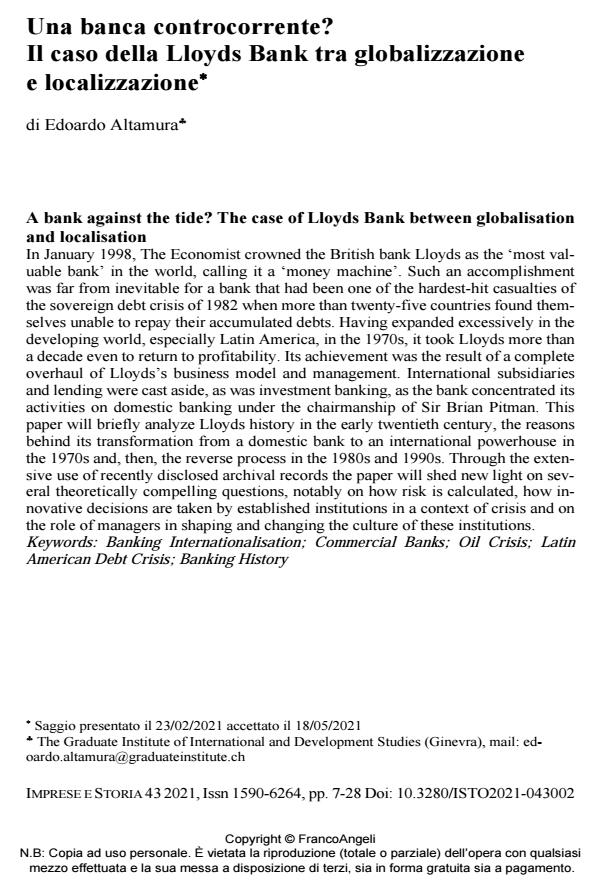Una banca controcorrente? Il caso della Lloyds Bank tra globalizzazione e localizzazione
Titolo Rivista IMPRESE E STORIA
Autori/Curatori Edoardo Altamura
Anno di pubblicazione 2021 Fascicolo 2021/43
Lingua Italiano Numero pagine 22 P. 7-28 Dimensione file 349 KB
DOI 10.3280/ISTO2021-043002
Il DOI è il codice a barre della proprietà intellettuale: per saperne di più
clicca qui
Qui sotto puoi vedere in anteprima la prima pagina di questo articolo.
Se questo articolo ti interessa, lo puoi acquistare (e scaricare in formato pdf) seguendo le facili indicazioni per acquistare il download credit. Acquista Download Credits per scaricare questo Articolo in formato PDF

FrancoAngeli è membro della Publishers International Linking Association, Inc (PILA)associazione indipendente e non profit per facilitare (attraverso i servizi tecnologici implementati da CrossRef.org) l’accesso degli studiosi ai contenuti digitali nelle pubblicazioni professionali e scientifiche
In January 1998, The Economist crowned the British bank Lloyds as the ‘most valuable bank’ in the world, calling it a ‘money machine’. Such an accomplish-ment was far from inevitable for a bank that had been one of the hardest-hit cas-ualties of the sovereign debt crisis of 1982 when more than twenty-five countries found themselves unable to repay their accumulated debts. Having expanded excessively in the developing world, especially Latin America, in the 1970s, it took Lloyds more than a decade even to return to profitability. Its achievement was the result of a complete overhaul of Lloyds’s business model and management. Inter-national subsidiaries and lending were cast aside, as was investment banking, as the bank concentrated its activities on domestic banking under the chairmanship of Sir Brian Pitman. This paper will briefly analyze Lloyds history in the early twentieth century, the reasons behind its transformation from a domestic bank to an international powerhouse in the 1970s and, then, the reverse process in the 1980s and 1990s. Through the extensive use of recently disclosed archival records the paper will shed new light on several theoretically compelling questions, notably on how risk is calculated, how innovative decisions are taken by established insti-tutions in a context of crisis and on the role of managers in shaping and changing the culture of these institutions.
Parole chiave:Banking Internationalisation; Commercial Banks; Oil Crisis; Latin American Debt Crisis; Banking History
Edoardo Altamura, Una banca controcorrente? Il caso della Lloyds Bank tra globalizzazione e localizzazione in "IMPRESE E STORIA" 43/2021, pp 7-28, DOI: 10.3280/ISTO2021-043002